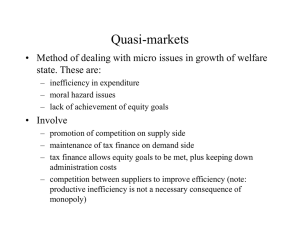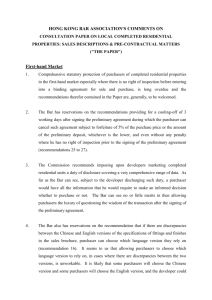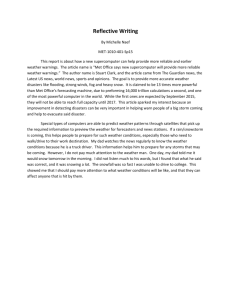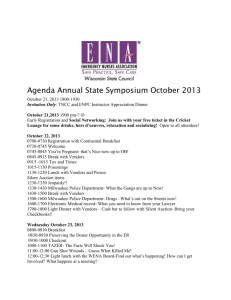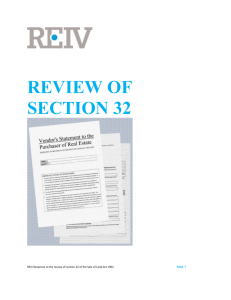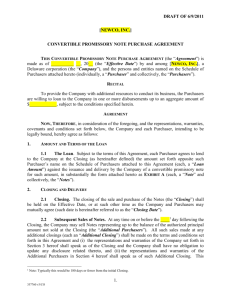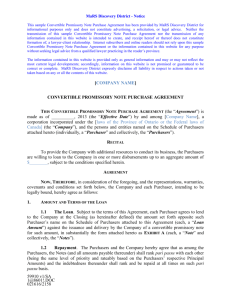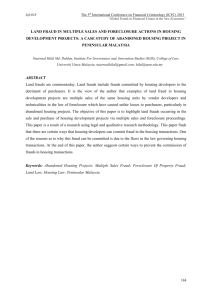Review of section 32 of the Sale of Land Act 1962
advertisement
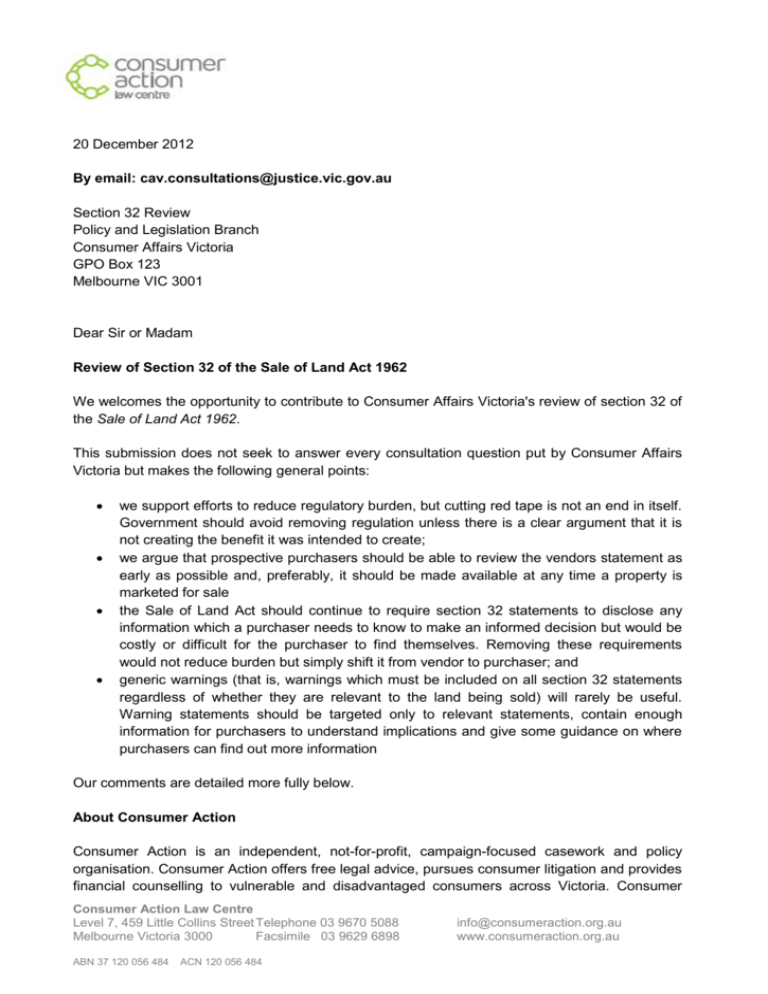
20 December 2012 By email: cav.consultations@justice.vic.gov.au Section 32 Review Policy and Legislation Branch Consumer Affairs Victoria GPO Box 123 Melbourne VIC 3001 Dear Sir or Madam Review of Section 32 of the Sale of Land Act 1962 We welcomes the opportunity to contribute to Consumer Affairs Victoria's review of section 32 of the Sale of Land Act 1962. This submission does not seek to answer every consultation question put by Consumer Affairs Victoria but makes the following general points: we support efforts to reduce regulatory burden, but cutting red tape is not an end in itself. Government should avoid removing regulation unless there is a clear argument that it is not creating the benefit it was intended to create; we argue that prospective purchasers should be able to review the vendors statement as early as possible and, preferably, it should be made available at any time a property is marketed for sale the Sale of Land Act should continue to require section 32 statements to disclose any information which a purchaser needs to know to make an informed decision but would be costly or difficult for the purchaser to find themselves. Removing these requirements would not reduce burden but simply shift it from vendor to purchaser; and generic warnings (that is, warnings which must be included on all section 32 statements regardless of whether they are relevant to the land being sold) will rarely be useful. Warning statements should be targeted only to relevant statements, contain enough information for purchasers to understand implications and give some guidance on where purchasers can find out more information Our comments are detailed more fully below. About Consumer Action Consumer Action is an independent, not-for-profit, campaign-focused casework and policy organisation. Consumer Action offers free legal advice, pursues consumer litigation and provides financial counselling to vulnerable and disadvantaged consumers across Victoria. Consumer Consumer Action Law Centre Level 7, 459 Little Collins Street Telephone 03 9670 5088 Melbourne Victoria 3000 Facsimile 03 9629 6898 ABN 37 120 056 484 ACN 120 056 484 info@consumeraction.org.au www.consumeraction.org.au Action is also a nationally-recognised and influential policy and research body, pursuing a law reform agenda across a range of important consumer issues at a governmental level, in the media, and in the community directly. 'Cutting red tape' and the benefits of regulation We approve of efforts to reduce unnecessary regulatory burden—such regulation only increases costs for consumers—but 'cutting red tape' is not an end in itself. All regulation is introduced because a government believes it will produce a benefit. In our view no regulation should be removed unless there is clear evidence that it is failing to produce that benefit or it is producing it at too great a cost. Removing good regulation may appear to create savings for business, but any savings are illusory if the regulation was enhancing the efficiency of the market or reducing disputes. These kinds of benefits can be much more difficult to measure than the compliance costs incurred by business, but are no less real. We suggest that rather than seeking to simply cut the number of requirements placed on vendors by section 32 statements, Government should use this review to consider how the section 32 process can be amended to ensure the sale of land is conducted efficiently and fairly. Timing of disclosure Prospective purchasers should be able to review disclosure documents as early as possible and, preferably, disclosure should be available at any time a property is marketed for sale. Without early availability of disclosure documents, potential purchasers may have insufficient time to consider the information and make necessary inquiries or may invest time and resources in making inquiries where disclosure might have suggested to them that the property was not suitable. We note the comment in the consultation paper that early disclosure raises cost implications as the vendor statement may require updating to maintain accuracy, and may delay the marketing of the property. We would like to see evidence for these statements, for example, the proportion of vendors statements that need to be updated and the actual costs involved. In our view, the regulatory regime should provide incentives for vendors to prepare an accurate vendors statement from the outset as this is likely to provide more efficient market outcomes. Information which is difficult to access The Sale of Land Act should continue to require vendors to disclose any information which a purchaser reasonably needs to make an informed decision but would be costly or difficult for them to access themselves. For example, section 32 notices currently require vendors to disclose details of debts incurred against the property, charges that may be incurred by a purchaser, undisclosed mortgages, easements, covenants and restrictions on land. These factors will significantly affect the value of the property for sale and (though likely known to the vendor) will not be apparent to most consumers inspecting a property. The requirement to disclose these factors improves the 2 operation of the market by correcting an information asymmetry and improving confidence in buyers. Removing the requirement to disclose information like this is unlikely to create any net benefit. Vendors will be relieved of a burden if they are no longer required to make this kind of disclosure, but that burden will simply be shifted to the consumer who will need to make the same investigations. Making the investigations will come at a cost for potential purchasers (and, potentially, a greater cost if more than one purchaser expends money and effort in seeking the information), and for those entering the property market, such as first home buyers, may serve to make housing less affordable. Purchasers may choose not to investigate but this comes with its own costs, either because it makes a future dispute more likely or because it involves the consumer bearing the burden of an unseen fault with the property. Generic warnings Section 32 currently requires notices to contain a number of generic warnings (that is, warnings which must be included on all section 32 statements regardless of whether they are relevant to the land being sold). Some warnings of this kind discussed by the consultation paper note that: planning or building controls may prohibit certain uses of the property, or that some uses may require consent of the relevant authority; and commercial agricultural activity may affect the purchaser's enjoyment of the land. Each of these warnings advise that it is in the buyer's best interests to obtain advice whether they may be affected. These warnings are unlikely to be helpful because they provide little indication of the risk, what the purchaser can do to avoid the risk or find out more information. In research into effective disclosure for consumer credit products, O'Shea (2010) found that generic warnings 'may be a distraction' and were 'at best ambiguous in terms of benefit'.1 We recommend that warnings in the section 32 statement be amended to ensure they are: targeted: in that they only appear in statements if they are relevant to the property discussed. In this case the first warning mentioned above (about planning controls) would still appear on all notices but the other would not. This will reduce the risk that section 32 notices swamp purchasers with irrelevant information and make it simpler to focus on relevant points; meaningful: notices should explain risks to purchasers as directly as possible. For example, instead of the planning controls warning noting that 'certain uses' of the property may be prohibited or require a permit, the warning should list examples of the most common uses which may be restricted. A warning that a purchasers 'may be prohibited from making renovations and extensions, constructing fences, pools, outbuildings or other uses of the land' is more meaningful than simply saying that 'certain uses' are not permitted. 1 The statements in O'Shea's research included warnings that 'new fees and charges may be imposed or existing fees and charges changed'. Paul O'Shea (2010) Simplification of Disclosure Regulation for the Consumer Credit Code: Empirical Research and Redesign - Final Report, Uniquest, p 98. 3 helpful: the notice should provide a first step for purchasers who want to find more information (for example, by explaining which authority can provide the information) rather than simply suggesting they investigate. Please contact David Leermakers on 03 9670 5088 or at david@consumeraction.org.au if you have any questions about this submission. Yours sincerely CONSUMER ACTION LAW CENTRE Gerard Brody Director, Policy and Campaigns David Leermakers Senior Policy Officer 4
